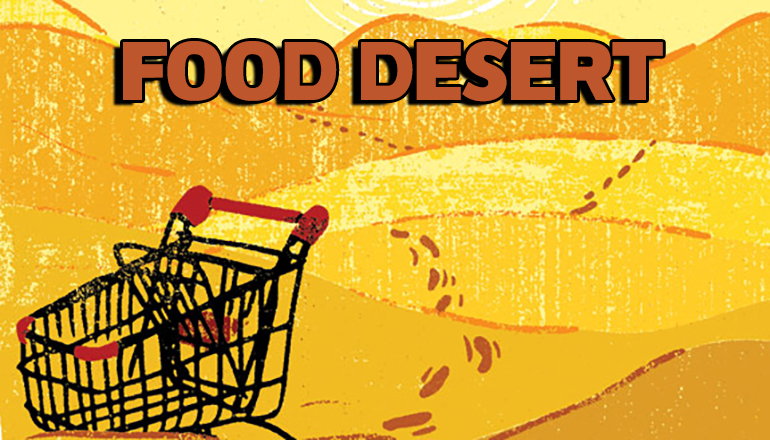(Missouri Independent) – The closure of Save A Lot in Pagedale left a hole in northern St. Louis County.
Beyond Housing, a community-building group that serves about two dozen cities in the area had worked through the Great Recession to bring a grocery store closer to low-income residents in a part of the St. Louis area dotted with food deserts.
But after a decade, the store closed up.
The symbolism of losing the first grocery store in Pagedale in 40 years was hard, said Chris Krehmeyer, CEO of Beyond Housing. For residents, it left just two other Save A Lots in the vicinity, Krehmeyer said, and another regional chain in a neighboring community. Those without cars were left without easy access to nutritious food and more likely to rely on convenience stores.
“Those with wealth don’t even think about it — well, of course, we have all the things we need,” Krehmeyer said. “Well, low-income communities don’t. And that makes life harder and more difficult and typically more expensive.”
It’s difficult to operate a grocery store in low-income neighborhoods, Krehmeyer said. If it weren’t, they would be there already. Krehmeyer said he has spoken with a variety of grocery chains who said they couldn’t make a profit in Beyond Housing’s service area, the boundaries of Normandy Schools Collaborative.
Several Democratic legislators from Kansas City and St. Louis have introduced legislation meant to bring more fresh food to urban food deserts through urban farming and offer incentives for grocery stores to locate in food deserts both urban and rural.
Grocery stores make notoriously thin profit margins, making it difficult to be successful.
As a result, both urban and rural Missourians find themselves in food deserts — low-income areas where urban residents are at least a mile from a grocery store and rural residents are 10 miles away. Limited access to food means those in food deserts either spend extra time and money getting to grocery stores or go without fresh produce.
Being able to access high-quality food at an affordable price, Krehmeyer said, is a quality of life issue.
“People are eating, but they’re buying terrible food at the corner bodega,” Krehmeyer said. “They’re not being healthy and they have to go out of their way to find what they want.”
Save A Lot said in a statement that the company takes the decision to close any store seriously. It decided to shutter the Pagedale location after a review of its financial performance and “strategic alignment with long-term plans.”
“We are grateful to our customers for their loyal support at the former location,” the chain said. “All employees from this store were offered positions in other local stores. Save A Lot has continued to serve customers from our other nearby locations.”
Sen. Barbara Washington, D-Kansas City, is sponsoring legislation meant to offer up to $5,000 in incentives to establish urban farms. It was supposed to be heard this week by the Senate Economic Development Committee, but meetings were canceled because of a storm that blanketed most of Missouri in snow.
Washington said in her district, which covers much of Kansas City’s predominantly Black East Side, there’s a grocery store where vegetables seen stereotypically as favorites of Black people might be offered fresh.
“But bananas, or apples or something like that, they’d be wrapped up in plastic so you wouldn’t be able to touch them to see whether or not they’re actually fresh and good vegetables,” she said.
There are two hydroponic farms in Washington’s district that raise fish and vegetables and teach young people about sustainability. She said Nile Valley Aquaponics, in the heart of the city, took over vacant lots that were blighting the community.
“To have a credit that would allow folks to have some incentive to build these things and help out with the community is something that we need to help agriculture in our state and to help those communities who often do not have as much access to fresh food,” she said.
Washington has offered the legislation for several sessions but it has yet to pass both the House and Senate.
Sen. Doug Beck, D-St. Louis County is sponsoring legislation to create a tax credit for grocery stores that open in food deserts. He’s offered it for several years, and it was heard by the Senate Economic Development Committee last month.
It had support from Missouri YMCAs, Empower Missouri, and other advocates.
Elena Bickell, a policy fellow for MOST Policy Initiative, which conducts nonpartisan research on Missouri legislation, said the state has 100 food deserts. As of 2017, she said 865,000 Missourians experience food insecurity.
Food deserts are not limited to urban areas. The Missouri Hunger Atlas, updated in 2019, found South and Southeast Missouri struggled the most with food insecurity.
As of 2016, 31 Missouri counties had two or fewer grocery stores, according to the U.S. Department of Agriculture. And while more than 20% of residents in some metropolitan counties, including St. Louis County and Jackson County, had low access to stores, the same was true for counties like Cape Girardeau, Ozark, and Nodaway, according to 2015 data from USDA.
“This legislation would go, I think, a long way to helping folks to be able to have an area where they can go shop and get some good quality food,” Beck said.







